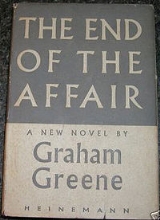
I have been voraciously reading used paperbacks for as long as I can remember. Everything from a torn and tattered copy of “The Crying of Lot 49,” from the initial print run, to modern classics like Joyce and Camus, in French. These small gems of joy have always held a certain air of fascination for me, and only lately am I finding that this is more so based on the fact that in many cases, I am certain that these volumes —my volumes— have already been poured over and studied by others; and I truly believe that the reader's influence still lingers on each and every dog-eared page and underlined sentence.
Recently, I saved a few paperbacks by Graham Greene from the bargain carts outside of the East Village bookstore where I work. At the time, this discovery seemed to me as little more than a coincidence. Given the nature of bargain carts, and their intended disarray, I felt fortunate to find two novels by the same author side-by-side. But it wasn't until I had purchased both, for a total of 50 cents, that I realized the true significance of my finds through the subtle inscription on the title page of each: 'Markson, Mexico '61.' These were the books of our recently deceased bookshop acquaintance, novelist David Markson who passed in early June of this year.
In setting out to place the relevance of these particular works to Markson's career —a man credited by David Foster Wallace as penning “the high point of experimental fiction this century”-- I was glad to find an interview in which Markson explained his time in Mexico and the genesis of his exploration into the possibilities of fiction. And, of course, who better to guide him than the masterly Greene. From this summation, I have become drawn into the idea of all of the questions I would have asked the novelist were he still alive and stopping into the store. I cannot help but feel that I somehow slighted myself from not realizing that this man I looked up to was not some intimidating, distant figure who drank with Dylan Thomas, but just a person who, like any, relied on influence and conversation to fuel his work and get him through the day.
A good friend once told me that “there is no use in competing with the living; only the dead.” and now I believe that I understand his point much more clearly than I ever could have before. Had I taken the time to speak with Markson on a more personal level, perhaps I would find a new sentiment behind the books we've now shared. Instead, I am left with pages of ominously unmarked text. Two books that I am having a hard time finishing, because I want to discuss them with someone who's read them and been influenced by them. As my bibliophilic mania continues on, this episode has served as a strong reminder that those who are living and creating around us, or even trying to create, must be chatted up; must be celebrated for their efforts; and most importantly, must be appreciated in their lifetime and given an honest chance to defend and express themselves without fear of unhealthy competition. This is a lesson I've yet to come across directly in any paperback, but one that I will gladly share with anyone who'll take the time to listen.
No comments:
Post a Comment